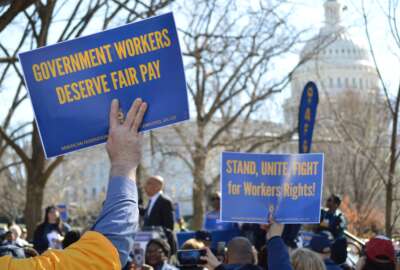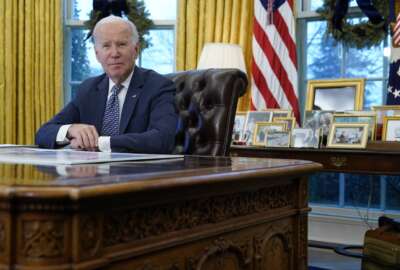
5.2% pay raise, blocking future Schedule F and more from the 2024 budget request
President Joe Biden’s fiscal 2024 budget request to Congress increases discretionary spending for defense and non-defense agencies with nine departments asking...
The White House is proposing the largest pay raise for federal employees and military service members in more than 40 years.
The fiscal 2024 budget request is asking Congress for a 5.2% federal pay raise.
The pay raise request is one of several efforts the Biden administration is signaling for how it wants to support the federal workforce through the budget.
The White House says the “skinny” budget released today “answers the President’s call for agencies to lead by example in supporting federal worker organizing and collective bargaining. In addition, the budget also maintains the administration’s unwavering support for the career civil service through its advancement of a legislative proposal to block Schedule F, which would threaten the proper functioning of the federal government by unduly subjecting career employees to politicization and favoritism.”
President Joe Biden’s pay raise plan, first reported by the Washington Post, would be the biggest raise for feds since the Carter administration offered up 9.1% in 1980.
If enacted, most civilian federal employees would see the boost in their first paychecks of January next year.
The administration did not detail the breakdown between the base pay raise and the average locality pay raise. But in recent years, federal pay bumps have typically factored in a 0.5% locality pay boost. The 2023 federal pay raise, enacted in January, was 4.6% on average, composed of a 4.1% base pay raise and a 0.5% average locality pay bump.
The White House’s pay raise proposal would likely face a tough fight from House Republicans, who have repeatedly criticized government spending during the Biden administration and vowed to conduct more robust investigations of federal agencies.
“Now President Biden is continuing to ensure that federal workers’ pay and benefits are insulated from the price tag of inflation, but it will be paid for by American taxpayers who continue to be harmed by the Biden administration’s inflationary policies,” House Oversight and Accountability Committee Chairman James Comer (R-Ky.) said in a statement about the anticipated federal pay raise proposal. “We should be putting American taxpayers first, not the federal bureaucracy.”
Discretionary spending up
Overall, discretionary spending across the government would increase for defense and non-defense agencies.
The White House is requesting $1.63 trillion in total discretionary funding, a 4.8% or $77.2 billion increase over 2023 enacted levels.
The defense agencies would receive $886.4 billion, a 3.3% or $28 billion increase over 2023 enacted.
Non-defense agencies would receive $688.1 billion, a 7.3% or $46.9 billion increase over this year’s budget. Nine agencies, including the departments of Health and Human Services and Treasury, the Environmental Protection Agency and the National Science Foundation, would see double digit increases for 2024.

The White House’s pay raise request remains well below the legislative proposal of an 8.7% average federal pay raise for 2024. The FAIR Act, which Democrats introduced in both the House and Senate, gained support in the House from one Republican, Rep. Brian Fitzpatrick (R-Pa.), as well as backing from unions and federal advocacy organizations.
The National Treasury Employees Union said a 5.2% raise in 2024 would be a “solid first step,” but the federal union is still calling for the larger pay bump included in the FAIR Act.
“We believe rising costs and previous years of inadequate pay increases warrant the average 8.7% adjustment called for in the FAIR Act,” NTEU National President Tony Reardon said in a statement. “The Federal Salary Council reports that federal salaries lag their private sector counterparts by 24.09%, and an average 8.7% adjustment would go further in helping federal agencies recruit and retain the employees they need to meet their important missions.”
NTEU also said it endorsed Biden’s call for a national comprehensive paid family and medical leave policy, which they say would be life-changing for federal employees and all workers across the country who struggle to deal with major medical situations in their family without falling behind on their monthly bills.
“As the appropriations process gets underway, NTEU plans to be there fighting for adequate agency funding levels and the necessary tools for recruiting and retaining the employees the federal government needs to address the challenges facing all Americans regarding health, security, safety and economic well-being,” Reardon said.
Other employee unions also were supportive of the president’s pay raise proposal.
“Keeping up with private sector pay growth is essential to maintaining the federal government’s ability to recruit and retain a highly qualified and effective workforce,” National Active and Retired Federal Employees (NARFE) Association National President William Shackelford said in a statement. “While pay rates for public servants will still trail private-sector rates, a proposed average raise of 5.2% would ensure they will not fall further behind.”
Each year, a president will typically submit an alternative pay plan to Congress in August, which incorporates the initial proposal from the budget. The President will then sign an executive order by the end of the calendar year to make the pay raise official for the next year. In recent years, Congress has occasionally included a separate federal pay raise proposal for civilian employees in an omnibus spending package, breaking away from the President’s request.
Biden’s 5.2% raise proposal also aligns with the latest adjustment to the Employment Cost Index for private sector wages and salaries, which is the basis for both the military pay raise and the default across-the-board raise for civilian federal employees.
Investing in the PMA goals
In addition to the pay raise, the administration says the budget aims to invest in the workforce in other ways, particularly through the President’s Management Agenda (PMA).
Among the areas of focus for 2024 and beyond is strengthening and empowering the federal workforce by expanding federal strategic agency hiring capacity, prioritizing robust early-career pipelines, implementing strategic diversity, equity, inclusion and accessibility plans and re-imagining Federal Executive Boards to foster coordination and collaboration amongst senior executives outside of Washington, to better communicate and execute the administration’s management and workforce priorities across regions and communities.
To that end, the administration wants to give the Office of Personnel Management a major influx of new funding.
OPM’s request is $464 million, more than $78 million over the 2023 enacted level for “salaries and expenses account to enhance the agency’s ability to lead federal human capital management and, in alignment with the agency’s strategic plan, to serve as a centralized leader in federal human resources. This funding would support staffing to improve customer service provided by OPM to federal agencies, allowing further collaboration in support of the federal government’s strategic workforce planning and talent acquisition functions.”
These efforts would include an expansion of OPM’s Hiring Experience Office to continue making progress on streamlining hiring, including through pooled hiring actions and improving the applicant hiring experience.
Additionally, the administration wants to invest in expanded and equitable access to federal paid internships.
“The budget also provides resources to support new agency requirements for personnel vetting improvements, and its Trusted Workforce 2.0 Implementation Strategy, which is designed to ensure all Americans can trust the federal workforce to protect people, property, information, and mission,” the budget states.
The White House also wants to further its effort to ensure pay equity for Transportation Security Administration employees. Congress approved $398 million in the 2023 omnibus bill to address the fact that TSA officers are generally paid about 30% less than their counterparts at other federal agencies. The agency also faces 20% annual staff turnover, and officials point to the agency’s low pay compared to the rest of the federal workforce as the primary issue when it comes to hiring and retaining employees.
The administration would include $1.1 billion above the 2023 enacted levels to fully fund the TSA pay equity initiative.
Copyright © 2025 Federal News Network. All rights reserved. This website is not intended for users located within the European Economic Area.
Drew Friedman is a workforce, pay and benefits reporter for Federal News Network.
Follow @dfriedmanWFED
Jason Miller is executive editor of Federal News Network and directs news coverage on the people, policy and programs of the federal government.
Follow @jmillerWFED





